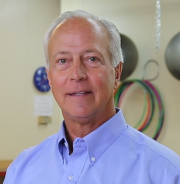The FedEx Cup Playoffs began at Ridgewood Country Club, went on to TPC Boston and this week are at Aronimink Country Club in Philadelphia. PGA players finished play on Monday in Boston and traveled to Philadelphia Monday evening. We opened the PGA Performance trailers Tuesday morning at 8am and many of the golfers began to come in. They played the entire week in Boston with temperatures in the nineties and now arrive to play in Philadelphia where it is expected to be in the nineties and humid the entire week. Many of the golfers surviving the weekly cuts from 125 to 100 to 70 have played numerous weeks in a row. Each week the competitive atmosphere intensifies. Unexpectedly the hot and humid conditions this week will be an additional concern. How the PGA golfers will handle these physical and psychological challenges will dictate their performance.
The PGA players are presenting with a vast array of injuries and movement pattern deficits. Fatigue is evident and can provoke psychological adaptations. Concentration and focus may not be as sharp and can disrupt their performance if they are not prepared.
As physical and psychological demands intensify, the golfer must make critical decisions to ensure peak performance. Choices include should they continue to train to maintain fitness, should they rest, or should they choose recovery protocol. Understanding their body's needs, tracking fitness regimes throughout their season, monitoring heart rate and dietary factors all contribute to the best decisions for performance.
The first consideration at this stage of the season relates to training. Training has to specifically monitored. A concern at this time of year is over-training. Signs of over-training include profound soreness, trouble sleeping, "rubbery" feeling in muscles, decrease in motivation, and feeling winded or exhausted when doing normal activities. Training stresses the body in a good way but systems have to recover. Whether the training program focuses on strength, is a split training regime, or is a high intensity interval training format, modifications have to be made to meet the current demands for performance. The golfer has to feel prepared physically to be sharp mentally.
Contrary to their conventional thought the golfer must consider when to rest. Rest allows the body to adapt and grow stronger. It is significant to restoring balance physically and psychologically. At this stage of the season with so much on the line however, rest is a difficult consideration for the professional golfer.
A game plan for recovery should be in place for the PGA player. Recovery is a complex concept that demands personal feedback from the golfer as well as assessment and monitoring from a sports medicine specialist. Recovery must consider sleep, diet, ice baths, compression garments, foam rollers, massage and hydration. The body must be given the opportunity to adapt and strengthen.
Short term (active) recovery occurs immediately after physical activity when the golfer comes off the course. The goal is to rid the body of toxins and stimulate muscle rebuilding. The focus is to perform body movements that do not tax the body. Stretching, compression garments, increasing protein intake, carbohydrate replenishment to restore glycogen stores, and hydration with amino acids and electrolytes are very important during this time period.
Long term recovery protocol typically has been established by the specialists who work with the players throughout the year. Their training regimes have built in days or weeks off. Depending on the golfer's fitness level at this stage of the season, changes may have to be made to their workout format.
Training, rest,and recovery. All are important aspects to review and modify at this stage of the season. Injuries, age, and fitness levels must be addressed and considered in any decision making process. Knowing the PGA golfers health profiles the sports chiropractor, physical therapist, and trainer can have a major influence on the players performance towards the end of the year. During the FedEx Cup playoffs the financial reward and personal satisfaction can make or break a career!

